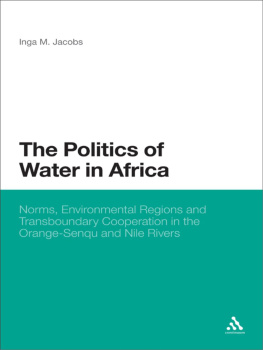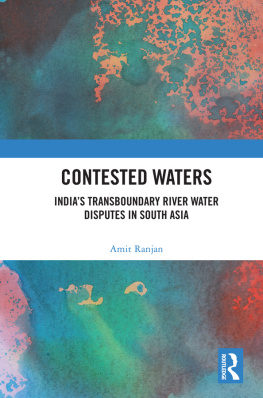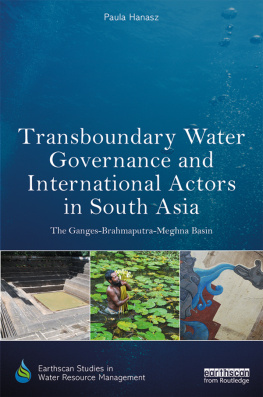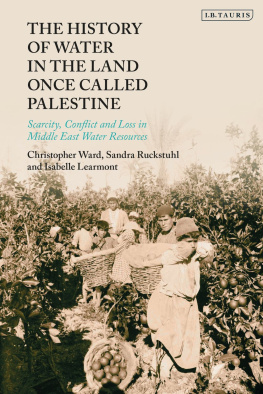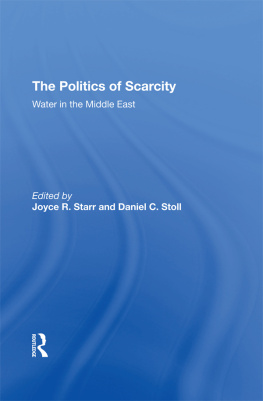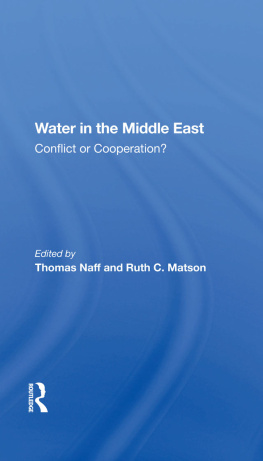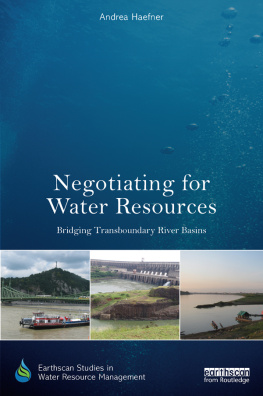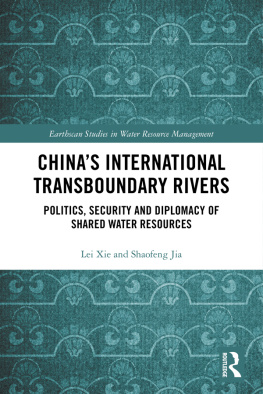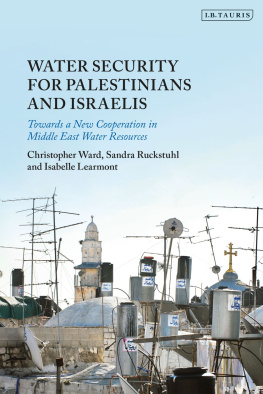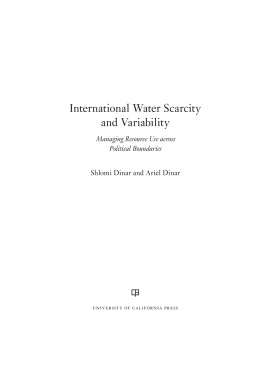Water Security in the Middle East
ANTHEM WATER DIPLOMACY SERIES
More effective resolution of our increasingly complex, boundary-crossing water problems demands integration of scientific knowledge of water in both natural and human systems along with the politics of real-world problem solving. Water professionals struggle to translate ideas that emerge from science and technology into the messy context of the real world. We need to find more effective ways to bridge the divide between theory and practice and resolve complex water management problems when natural, societal and political elements cross multiple sectors and interact in unpredictable ways. The Anthem Water Diplomacy Series is a step in that direction. Contributions in this series diagnose water governance and management problems, identify intervention points and possible policy changes, and propose sustainable solutions that are sensitive to diverse viewpoints as well as conflicting values, ambiguities and uncertainties.
Series Editor
Shafiqul Islam Tufts University, USA
Editorial Board
Yaneer Bar-Yam New England Complex Systems Institute, USA
Qingyun Duan Beijing Normal University, China
Peter Gleick Pacific Institute, USA
Jerson Kelman Federal University of Rio de Janeiro, Brazil
Greg Koch Global Water Stewardship, The Coca Cola Company, USA
Dennis Lettenmaier University of Washington, USA
Patricia Mulroy Southern Nevada Water Authority, USA
Ainun Nishat BRAC University, Bangladesh
Stuart Orr WWF International, Switzerland
Salman Salman Fellow, International Water Resources Association (IWRA), France
Poh-Ling Tan Griffith Law School, Australia
Vaughan Turekian American Association for the Advancement of Science, USA
Anthony Turton University of Free State, South Africa
Sergei Vinogradov University of Dundee, UK
Patricia Wouters University of Dundee, UK
Water Security in the
Middle East
Essays in Scientific and
Social Cooperation
Edited by Jean Axelrad Cahan

Anthem Press
An imprint of Wimbledon Publishing Company
www.anthempress.com
This edition first published in UK and USA 2017
by ANTHEM PRESS
7576 Blackfriars Road, London SE1 8HA, UK
or PO Box 9779, London SW19 7ZG, UK
and
244 Madison Ave #116, New York, NY 10016, USA
2017 Jean Axelrad Cahan editorial matter and selection; individual chapters individual contributors
The moral right of the authors has been asserted.
All rights reserved. Without limiting the rights under copyright reserved above, no part of this publication may be reproduced, stored or introduced into a retrieval system, or transmitted, in any form or by any means (electronic, mechanical, photocopying, recording or otherwise), without the prior written permission of both the copyright owner and the above publisher of this book.
British Library Cataloguing-in-Publication Data
A catalogue record for this book is available from the British Library.
Library of Congress Cataloging-in-Publication Data
A catalog record for this book has been requested.
ISBN-13: 978-1-78308-566-8 (Hbk)
ISBN-10: 1-78308-566-5 (Hbk)
This title is also available as an e-book.
CONTENTS
Roberto L. Lenton
| Jean Axelrad Cahan |
| Patrice C. McMahon |
| Jenny R. Kehl |
| Hussein A. Amery |
| Clive Lipchin and Tamee Albrecht |
| Alon Tal |
| Neda A. Zawahri |
| David P. Forsythe |
| Lawrence E. Susskind |
Figures
Tables
The Ruth Kroon Fund, under the auspices of the Norman and Bernice Harris Center for Judaic Studies, and the Robert B. Daugherty Water for Food Global Institute at the University of Nebraska provided generous support for the symposium associated with this volume. Dr. Adam R. Thompson, assistant director of the Kutak Center for Applied Ethics at University of Nebraska, contributed valuable research assistance.
The importance of water and food security in the Middle East, the most water-short region in the world and one where food supplies are often impacted by drought, cannot be overstated. A significant proportion of the population of this region is both food insecure and water insecurewithout access to enough safe and nutritious food nor an acceptable quantity and quality of water to lead healthy and active livesand exposed to frequent droughts. Ensuring sustainable food and water security for the people of this region in the face of rising population and income, a changing climate, and growing demands for scarce water resources amid falling groundwater tables and increasing water pollution and salinization is one of the regions most urgent challenges, with significant political, environmental, social and economic implications. Indeed, prospects for peace and security in the Middle East depend to a very significant degree on water and food security.
This water and food challenge is exacerbated by and intertwined with the civil war in Syria and related conflicts and civil unrest in many other countries in the area. While not everyone agrees that water shortages and inadequate responses to a severe and long-lasting drought were among the root causes of the outbreak of the civil war in Syria, there is little doubt that the large numbers of refugees in neighboring countries have strained limited water supplies. The water and food security situations of the various countries of the region are further linked because so many countries depend on surface and underground water resources that cross international borders. Few countries in the region can fully control their water resources without engaging in cooperative approaches with other countries, which is fraught with difficulties in a region wracked by war and unrest. A major question in the region is therefore whether the quest for water and food security going forward will advance efforts toward cooperation and peace building or lead to further competition and conflict. While some observers have talked gloomily about the prospects for water wars, several scholars have argued persuasively that water is more often a mechanism for bringing people together to forge common solutions than a cause of war or violence.
This message is reinforced by Water Security in the Middle East: Essays in Scientific and Social Cooperation, and is one reason why it is exceptionally timely. The book arose out of a symposium on water in the Middle East jointly organized and sponsored by the University of Nebraska Norman and Bernice Harris Center for Judaic Studies and the Global Studies Program as well as the Robert B. Daugherty Water for Food Institute at the University of Nebraska in May 2014. The event brought together leading scholars and practitioners in water rights, conflict resolution and environmental studies in the region to discuss how water security in the Middle East will affect political and cultural discourse in the future. The event, organized by Jean Cahan, then director of the Harris Center, and Patrice C. McMahon, associate professor in University of Nebraskas Department of Political Science, aimed to raise awareness that water insecurity can exacerbate political and cultural tensions and to foster discussion on these issues among natural scientists and scholars from the humanities and social sciences.
Water Security in the Middle East is an important addition to the literature for at least three reasons. First, the books contributors include some of the worlds most knowledgeable scholars and practitioners on water in the Middle East, who know firsthand the scientific and technical dimensions of water security in the region as well as the broader issues of water diplomacy, public policy and politics. Second, the volume brings together in one place several thoughtful essays on a range of highly relevant subjects, including cooperation on transboundary systems in intractable conflicts, water demand management, climate change along transboundary basins and the role of adaptive management and technology, to name just a few. And third, the book explicitly seeks to incorporate a range of disciplinary perspectives from the physical and natural sciences as well as from philosophy, anthropology, religious studies, history, political science, sociology and economics. In so doing, the book provides a comprehensive understanding of the linkages between water and other social, political and philosophical issues.
Next page

